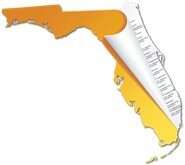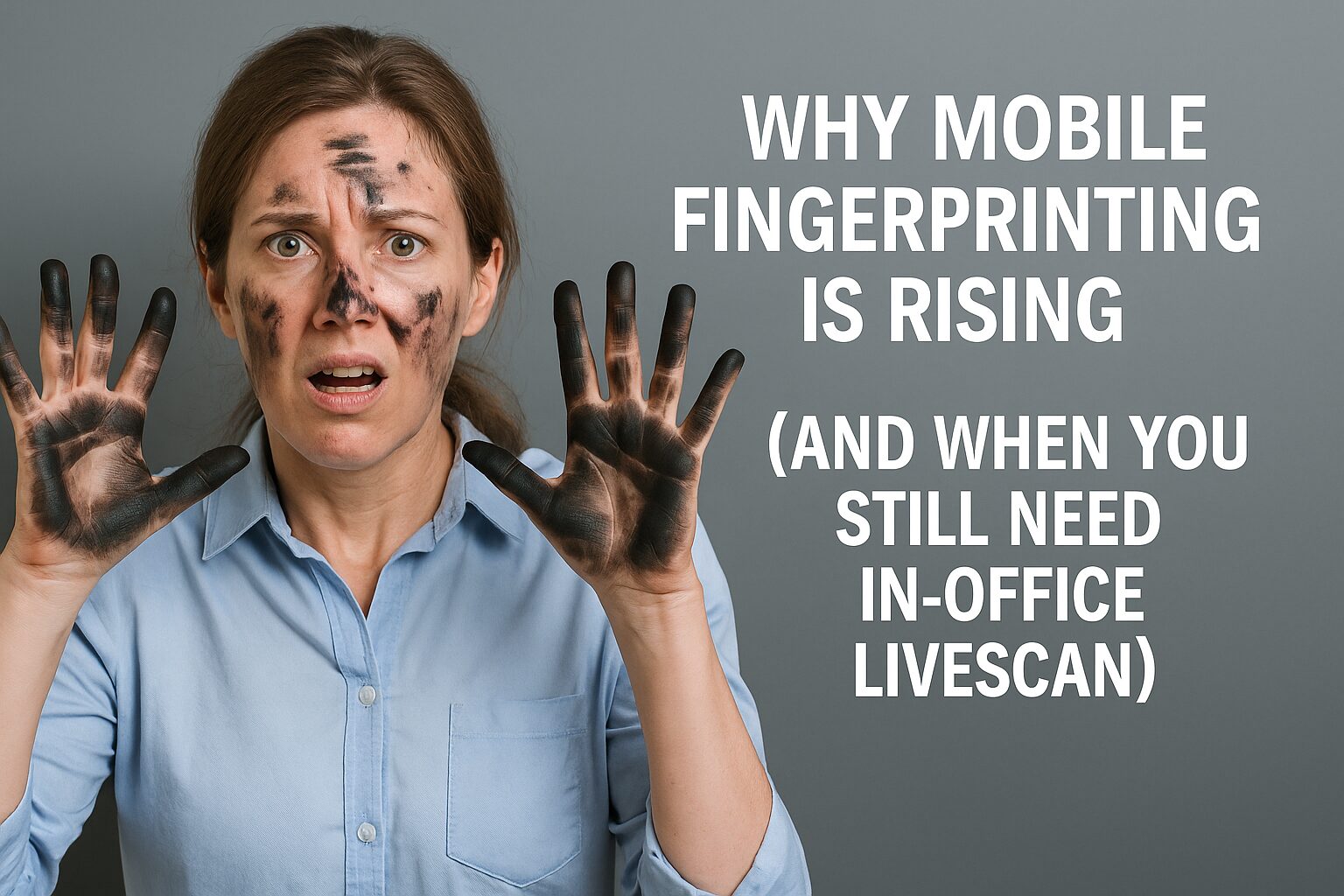Why Mobile Fingerprinting Is Rising (and When You Still Need In-Office LiveScan)
Mobile Fingerprinting Is Booming — But Not for the Reasons You Think
Mobile fingerprinting has exploded in popularity. Expats, remote workers, Puerto Rico applicants, international job seekers, and HR managers staring down onboarding deadlines all want the same thing: convenience.
And for the right type of background check — particularly FBI Identity History Summary reports — a trained mobile fingerprint specialist can deliver perfect, agency-ready fingerprint cards right at someone’s kitchen table.
But mobile fingerprinting isn’t a universal substitute for in-office LiveScan. FDLE Level-2 and AHCA screenings have identity-binding requirements that ink cards simply cannot satisfy. Meanwhile, modern ceramic-pad technology has buried the old “smudged ink everywhere” stereotype next to VHS tapes and floppy disks.
What follows is a clear breakdown of when mobile fingerprinting is the perfect tool, when it’s not permitted at all, and why equipment and technique matter more than most people assume.
Convenience & Demand
Why Mobile Fingerprinting Is Growing
The surge in mobile fingerprinting is driven by one factor above all else: convenience. Expats, professionals working abroad, remote employees, and HR teams onboarding multiple candidates at once appreciate the ability to complete fingerprinting without travel or schedule disruption.
Mobile appointments eliminate commutes, offer evening and weekend availability, and allow organizations to handle screening on-site. When the background check type accepts high-quality inked fingerprint cards, nothing is more efficient.
For many people, mobile fingerprinting is not just helpful — it’s the only practical option. The key is knowing when it fits the requirements and when LiveScan is mandatory.
Compliance Requirements
Why FDLE Level-2 and AHCA Cannot Be Completed Fully in the Field
FDLE Level-2 and AHCA background checks require a digital facial photograph that must be captured using a camera physically connected to an approved LiveScan or electronic submission workstation. This photo is bound to the fingerprint data inside the secure EFT submission.
Because of this strict identity-binding requirement, the photograph cannot be taken on a phone, emailed, uploaded, or added later. It must be captured en the approved software environment at the moment the fingerprints are submitted electronically.
Ink fingerprints can only be taken in the field when the ORI no require a facial image. When a photo is required, in-office LiveScan is mandatory by law — not optional.
When Mobile Works
When Ink Prints Can Be Digitally Submitted — And What “CardScan” Actually Means
Some Florida background checks do no require a facial photograph. In these cases, ink fingerprints taken in the field can be converted into a digital submission at our office using specialized, certified equipment.
This process is commonly called CardScan, but the name misleads most people into imagining a basic desktop scanner. The reality is very different — and far more technical.
CardScan means your prints are taken on a card, then digitized on FBI-certified equipment — not a copier, not a phone app, and not your cousin’s all-in-one scanner.
At our office, we convert the fingerprint card into an electronic submission using FDLE- and FBI-approved hardware, drivers, and software that undergo strict federal certification. It’s sophisticated, expensive technology — nothing like scanning a form at home.
FBI Compatibility
Where Mobile Fingerprinting Truly Excels — FBI Identity History Summary Checks
If mobile fingerprinting has a “home field,” it’s the FBI Identity History Summary (IdHS). This report is used for a wide range of purposes, including international employment, residency visas, citizenship applications, federal contract work, adoption, apostilles, and countless expat requirements.
Unlike FDLE Level-2 and AHCA submissions, the FBI does no require a LiveScan-linked photo. It accepts high-quality inked fingerprint cards as long as the prints are clear, correctly rolled, and produced using the right materials.
With modern ceramic fingerprint pads and trained technicians, inked cards from mobile appointments can match — and often exceed — the clarity of prints produced by low-end LiveScan devices. For many applicants, a mobile session is faster, cleaner, and more practical.
Modern Tools
Why Modern Ceramic Pads Outperform Traditional Ink — No Smudges, No Mess, No Go-Jo Required
The old image of mobile fingerprinting — a tech showing up with a metal ink slab, a roller, and enough black ink to redecorate your kitchen — is obsolete. Traditional inks were messy, easy to over-apply, and notorious for smudging. Applicants practically needed a bucket of Go-Jo afterward.
Florida Document Specialists uses ceramic fingerprint pads filled with a specialized, micro-porous ink matrix. These pads dispense the exact amount of ink needed for each roll — no more, no less — which makes it practically impossible to over-ink the fingers.
The result is sharper ridge detail, fewer smudges, cleaner hands, and a far higher acceptance rate. The ink dries quickly, wipes off easily, and produces prints that rival — and often exceed — the clarity from low-end LiveScan units.
For mobile appointments, this matters. Technique is critical, but the tools matter just as much. It’s technique plus tools — and Florida Document Specialists doesn’t cut corners on either.
On-Site Capability
Taking LiveScan Into the Field — Group Screenings, Schools, and Workforce Events
Mobile fingerprinting isn’t limited to ink cards. When a large group needs Level-2 screenings — teachers, nursing students, healthcare staff, nonprofit teams, or contractors — Florida Document Specialists can transport fully-certified LiveScan equipment and photo stations directly to the site.
LiveScan hardware and licensing are expensive and somewhat fragile, with high-quality stations often exceeding $10,000. But the benefit is unmistakable: when the situation calls for LiveScan rather than ink, bringing the equipment to the group keeps the entire process efficient, compliant, and fast.
For organizations managing onboarding waves or semester-start requirements, on-site screening means fewer scheduling issues, shorter queues, and a smoother experience for everyone involved.
Mobile Identity Verification
Mobile KYC — The Same Identity Verification We Use In-Office
Most mobile fingerprinting providers stop at rolling the prints. Florida Document Specialists goes several steps further. Because we carry a portable, FBI-compliant identity scanner, our specialists can perform the same Verified-KYC workflow in the field that we run in-office.
This includes credential analysis of the ID document, front-and-back authentication, biometric facial matching, liveness detection, and a full KYC report documenting that identity was verified properly.
The result: mobile applicants receive the exact same identity verification protections, safeguards, and documentation as our in-office LiveScan clients — a level of mobile capability rarely offered in the United States, and even more valuable in Puerto Rico, Central America, and South America.
For employers who want a copy of the KYC report for their compliance file, it can be provided with the applicant’s consent. But the KYC itself is always included as part of our standard workflow.
International Reach
Mobile Fingerprinting for Expats, International Applicants, and Global Use Cases
Not every applicant is in Florida. And not every applicant is even in the United States. Because FBI Identity History Summary checks accept high-quality inked fingerprint cards, people living abroad can benefit from the exact same mobile-grade print quality that we provide domestically.
Whether someone is pursuing residency in Europe, employment in South America, citizenship in Central America, or background checks for international contract work, the same ceramic-pad clarity applies. Crisp, properly rolled fingerprint cards dramatically reduce rejection risk — a major relief for applicants who don’t have local access to U.S.-standard fingerprinting.
Puerto Rico is a perfect example. Without a local equivalent to FDLE storing prints and histories, FBI checks are the primary option. High-quality inked cards are in high demand, and the improved clarity from ceramic pads makes the process faster and more reliable than many local alternatives.
Choosing the Right Method
When Mobile Fingerprinting Is Perfect — And When You Still Need In-Office LiveScan
Mobile fingerprinting shines for the FBI report and any background check that accepts inked fingerprint cards. It’s flexible, fast, efficient, and ideal for individuals, families, businesses, and applicants who can’t make it to an office.
But when a background check requires a digitally captured photo — FDLE Level-2, AHCA Clearinghouse, ORIs involving vulnerable populations, and any screening with statutory LiveScan requirements — an in-office visit becomes mandatory. No mobile provider, anywhere, can legally bypass those requirements with ink alone.
Understanding the difference between “allowed by the agency” and “technically possible with the right tools” is what saves applicants from delays and rejections. Mobile for what’s compatible; LiveScan for what’s required.
When Livescan Is Required
Need FDLE Level-2 or AHCA Screening? That’s When an In-Office LiveScan Is Mandatory
For background checks that legally require a digitally captured photo — including FDLE Level-2, AHCA Clearinghouse submissions, and any ORI with statutory identity-binding rules — an in-office LiveScan appointment is the only permitted method. This isn’t about accuracy; it’s strictly an agency requirement.
Our office provides the hardware, photo systems, and certified submission software needed to meet those regulations. If your screening requires LiveScan, we’ll make sure the entire process is handled cleanly, correctly, and without delays.
Book an in-office LiveScan appointment when your background check requires a digital photo and electronic submission. For all other checks — including the FBI report — mobile fingerprinting remains fully compatible.
John Bayne
Co-Founder & CEO | Florida Document Specialists
📞 (386) 218-2523
📧 john@floridadocument.com
💬 Chatea con nosotros en WhatsApp
Servicios de apostilla | Notarización en línea | LiveScan | Grabación electrónica
🌴 De propiedad familiar en Florida | De confianza en todo el mundo
💼 Asóciese con nosotros - Únase a nuestro programa de afiliados

